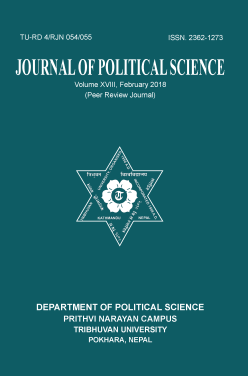Parties' Polarization and their Impact on Democracy
DOI:
https://doi.org/10.3126/jps.v18i0.20441Keywords:
Alliance, democracy, political party, polarization, performanceAbstract
Political parties are the major agents of a political process. In the democratic system of governance, political parties are thought to be the inevitable factors. Political parties are said to be as the lubricant oil of democracy, engine of democracy, fuel of democracy, life line of democracy and energy of democracy in the democratic system. Democracy is the political system which is regulated and performed by the political parties. For the well functioning of a democratic system, the political parties should follow perform the democratic values and norms properly. All the parties but mainly the ruling party or parties should be always committed towards the achievement of democratic values. Party may be polarized but they should not be polarized for and against the democratic norms and values. When political get parties polarized going for and against constitutional guidelines then it may be proved disastrous for democracy. Now in Nepal political parties have been polarized making their own alliance during the election time. Left alliance has declared that they will make the unified single communist party for political stability and economic prosperity. Democratic alliance mainly Nepali congress has claimed that left alliance is not for nation but for imposing totalitarianism and authoritarianism in the country. Polarization of political party will bring both the positive and negative impacts in the democratic polity. To make success the democratic system of governance, party may be polarized and unified but they must not to be polarized to make weaken the democracy. The major objectives of this article are to show the major values of democracy, to show the patterns of polarization of political parties and to analyze the impacts of polarization of political parties. To meet these objectives descriptive-analytical methodology of study has been applied. To draw the conclusion, both qualitative and quantitative information have been taken from secondary method.
Journal of Political Science, Volume XVIII, 2018, page: 62-81




